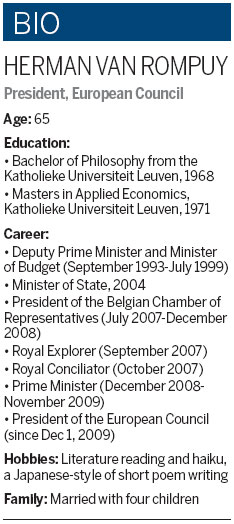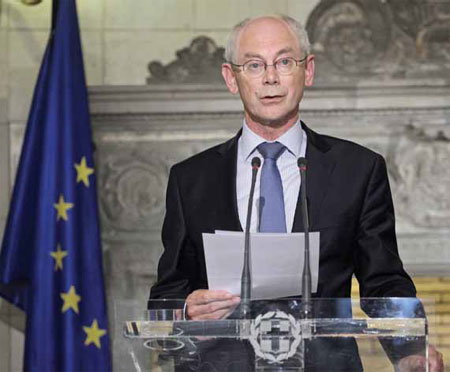Looking ahead with confidence

| European Council President Herman Van Rompuy says Europe can help in China's transformation. Petros Giannakouris / Associated Press |

European Council president says China has big role to play in the global economic recovery
The next three months may prove to be the most crucial for the European Union as its top helmsmen attempt to steer the continent onto a new growth path and away from the sovereign debt crisis.
The captain of the ship, Herman Van Rompuy, however, feels that China will have a big role to play in the new European voyage. Van Rompuy, president of the European Council, is expected to discuss the special role of China in the European recovery process during his deliberations with Premier Wen Jiabao at the 15th EU-China Summit in Brussels on Thursday.
The primary objective of the meeting is to "sow the seeds", deepen bilateral cooperation and ask Beijing to shoulder more international responsibility, Van Rompuy says.
Van Rompuy says that much of the credit for the current level of ties between the two sides goes to Wen. "The Chinese premier made several visits to Europe after the debt crisis started and has offered us constant support and help."
Apart from signing multi-billion-dollar business deals at the summit, Wen, who will step down as premier next year after completing two terms, will also discuss with European leaders ways to regain "confidence", which he feels is "more valuable than gold" in Europe.
Van Rompuy says that the essence of the relations between the two sides has not changed much since the first EU-China summit in Brussels in 2003, and it still is focused on furthering relations and setting up more "comprehensive strategic partnerships", an idea first mooted by Wen.
"In 2003, there were just 15 member states in the EU, and the euro had just been in circulation for a year. I myself was a member of the Chamber of Representatives in the Belgian Federal Parliament," he says. China, at that time, was the EU's sixth-largest trading partner with a per capita income of around $1,000 (765 euros) and was continuing its reform process, and had just allowed private property ownership.
Van Rompuy says that a lot has changed since then. "Today there are 27 member states in the EU. The main focus of my second term as the president of the European Council is to lead the EU and its member states out of the most difficult challenge since the adoption of the Lisbon Treaty."
The Belgian statesman assumed office as the first president of the European Council in 2010, just around the time the debt crisis started springing up in various parts of Europe. He was elected for a new two-year term earlier this year.
China, on the other hand, has emerged as the EU's second-largest trading partner, with a 2011 per capita income of around $5,400 and is currently on its way to be the world's largest economy.
With such tremendous changes on both sides over the last decade, Van Rompuy feels that the time is now right for a strong and cooperative network based on the three high-level dialogues - strategic issues, trade and economy and people-to-people contacts - to be developed between Beijing and Brussels.
"These three pillars of cooperation are underpinned by over 50 sectoral dialogues and mechanisms," he says.
Van Rompuy says that the areas of cooperation are further expanding, especially those relating to security and defense policies. The initial bilateral cooperation - focused on trade matters - has evolved over a decade into a truly strategic partnership, which goes much beyond bilateral trade and cooperation to embrace climate change, peace and security, human rights, energy security and the global financial architecture.
"China and Europe, as major world players, cannot meet frequently enough," Van Rompuy says.
In February, European and Chinese leaders met for their delayed annual summit, which should have actually taken place in the second half of last year. But at that time, Brussels was busy coping with the worsening debt crisis and could not make time to prepare for a political gathering.
At the February summit between the two sides, a long list of cooperation points in the form of a five-page communique was prepared, saying that they should work hard on strategically mutual trust, China's market economy status, an investment pact, boost trade volumes and refrain from using trade protection measures.
"Since last February's summit in Beijing intensive work has been carried out to fulfill the decision to further strengthen our bilateral agenda," Van Rompuy says.
The urbanization partnership, the people-to-people dialogue, the cyber task force, just to name a few, have been launched over the past seven months. Other initiatives in the pipeline include an investment agreement, energy cooperation, transport policy and security issues.
Though Beijing is satisfied with the progress of bilateral relations, it has not taken too kindly to the decision by the EU to initiate an anti-dumping investigation on solar panel imports from China. Experts feel that such a move was uncalled for at a time when the EU was seeking China's help to solve the debt crisis.
"Issues like these will be discussed and deliberated at the Brussels meetings and we will strive to find acceptable solutions," Van Rompuy says.
At the same time, Van Rompuy also says that the partnership between the two sides is firmly rooted in today's world and hence the international and global agenda will also be important areas of discussion.
Since February the escalating crisis in Syria, evolving challenges in Asia, financial difficulties in the eurozone, the follow-up of the G20 Los Cabos agenda on the global financial architecture all require solutions, he says.
"The upcoming summit is a good occasion to make further progress on our international and global cooperation," he says.
Van Rompuy says he was really impressed with the speed and depth of economic development in China. Van Rompuy made two visits to China, in May 2011 and February this year.
"Over the last 10 years millions of Chinese have been raised out of poverty. Currently millions of Chinese are moving from the countryside to cities," Van Rompuy says.
"These massive transformations need careful handling as they create a multitude of overlapping social, cultural, economic and political challenges," he says.
Van Rompuy says the Chinese leadership has put extra emphasis on the quality of growth and rebalancing of the economic model with more focus on domestic consumption and welfare in the ongoing Five-Year Plan (2011-15).
"These are very important, concrete steps, which are going, in my view, in the right direction," Van Rompuy says.
However, during such a complex transition, he says, there is a need for mechanisms and procedures to make the whole process more transparent and predictable.
"These are areas where the EU - with a wealth of regulatory experience - is interested in deepening dialogue and cooperation, along with enhanced dialogue on public policy reform across a broad range of sectors," Van Rompuy says.
Globally, Van Rompuy says Brussels more than ever needs Beijing's cooperation.
"As I said before: more than ever today, the world is shaped by events which in many cases create challenges to our peace and security," he says.
Three challenges in the world - climate change, the global economic crisis and nuclear proliferation - know no national borders.
"As regards to international security, building on our common work in addressing the Iran nuclear issue, I look forward to stronger cooperation with China in other crisis areas such as Sudan and Syria," he says.
The European Council president, however, reiterated that European leaders are firmly attached to the irreversibility of the euro and the integrity of the eurozone.
"The political determination to emerge from the crisis is very strong in Europe," he says. "They know that the stakes are high. It will take time, but I am sure we will get there."
What Van Rompuy doesn't know is that he has already set an excellent example of public diplomacy by attracting more than 1.1 million followers to his weibo - China's twitter-like platform. In contrast, he just has more than 70,000 Twitter users who are following him.
fujing@chinadaily.com.cn
(China Daily 09/20/2012 page32)
Today's Top News
- Experts share ideas on advancing human rights
- Japan PM's remarks on Taiwan send severely wrong signal
- Key steps to boost RMB's intl standing highlighted
- Sustained fight against corruption urged
- Xi calls for promotion of spirit of volunteerism
- Xi calls for promoting volunteer spirit to serve national rejuvenation































